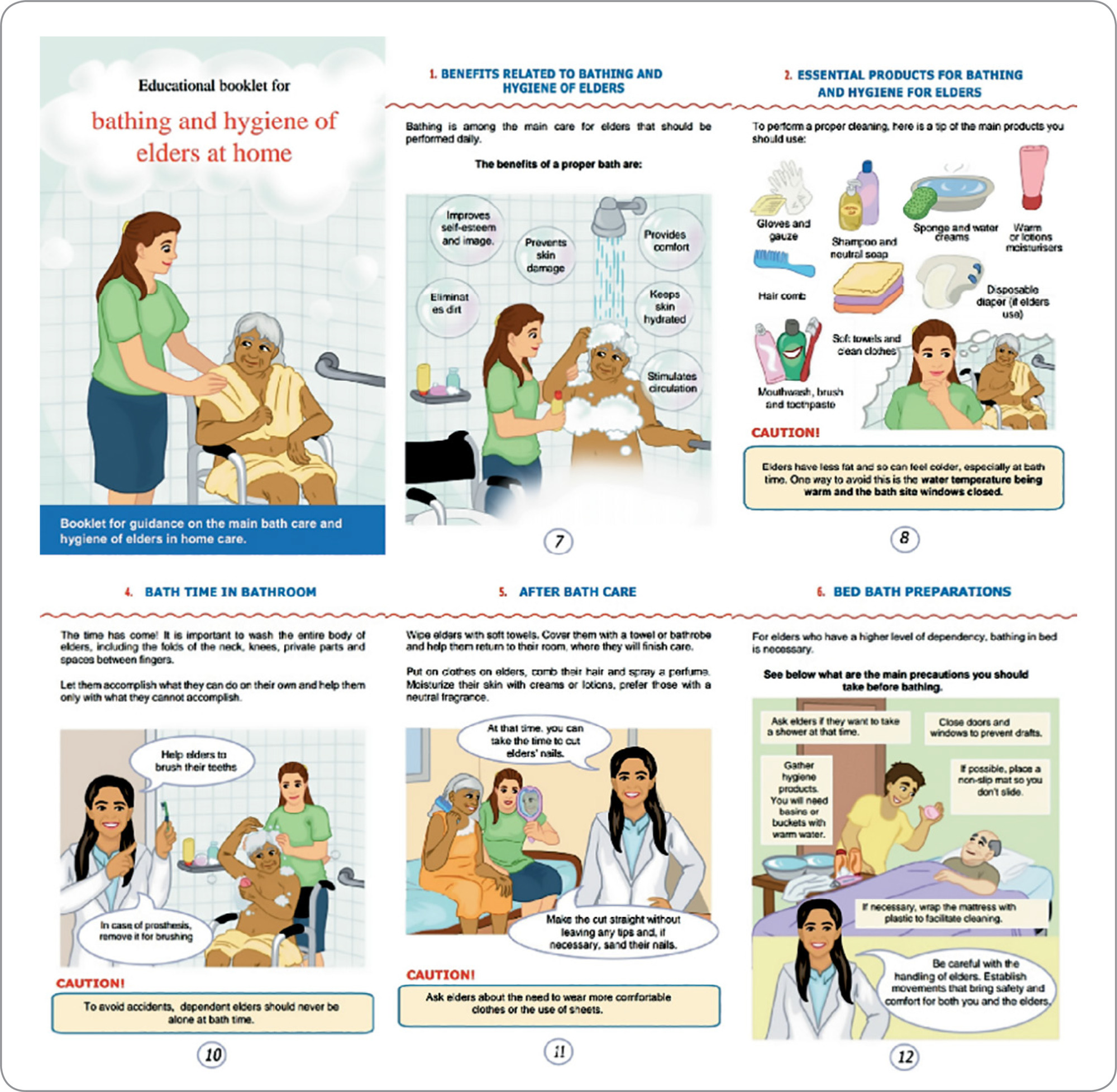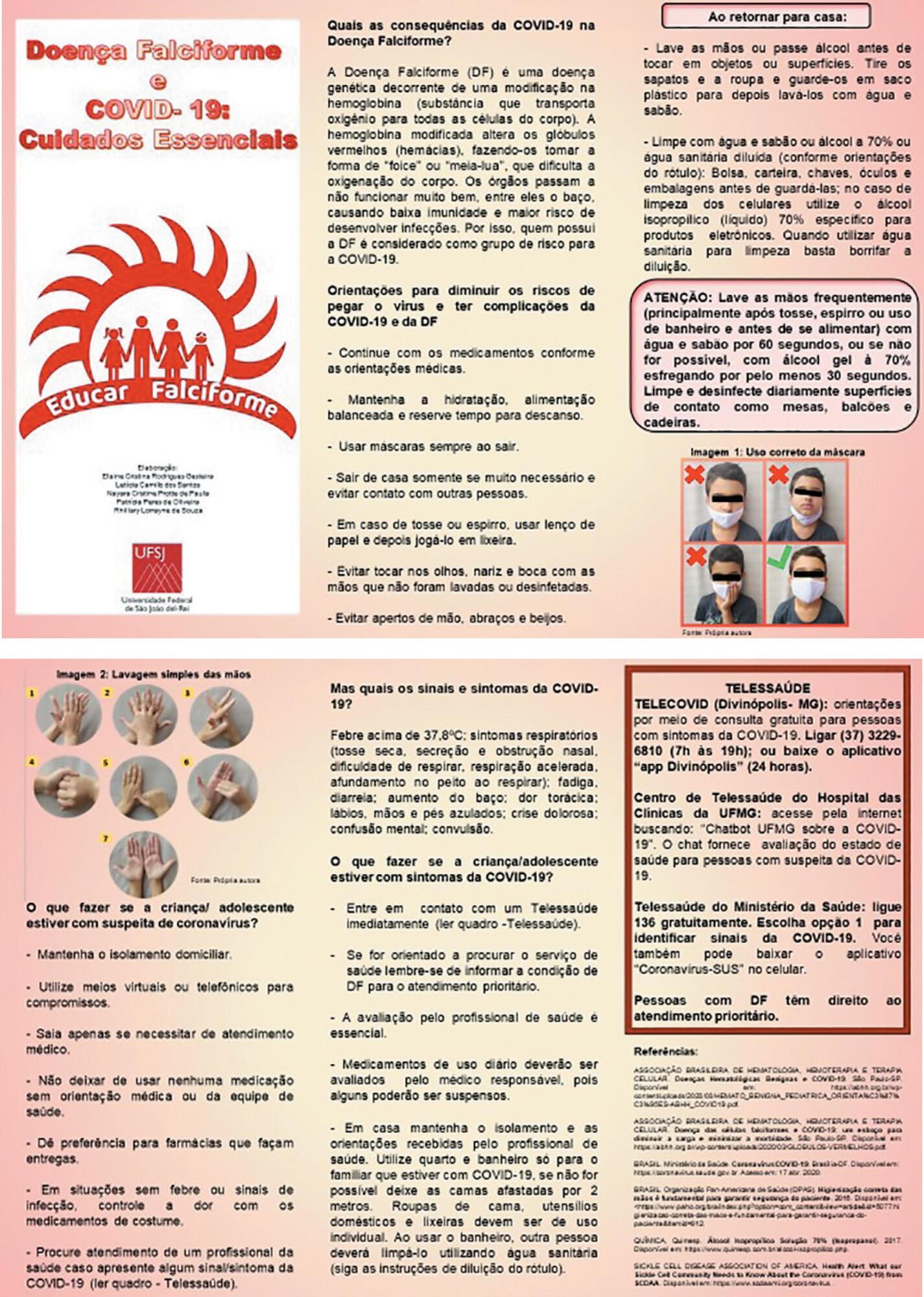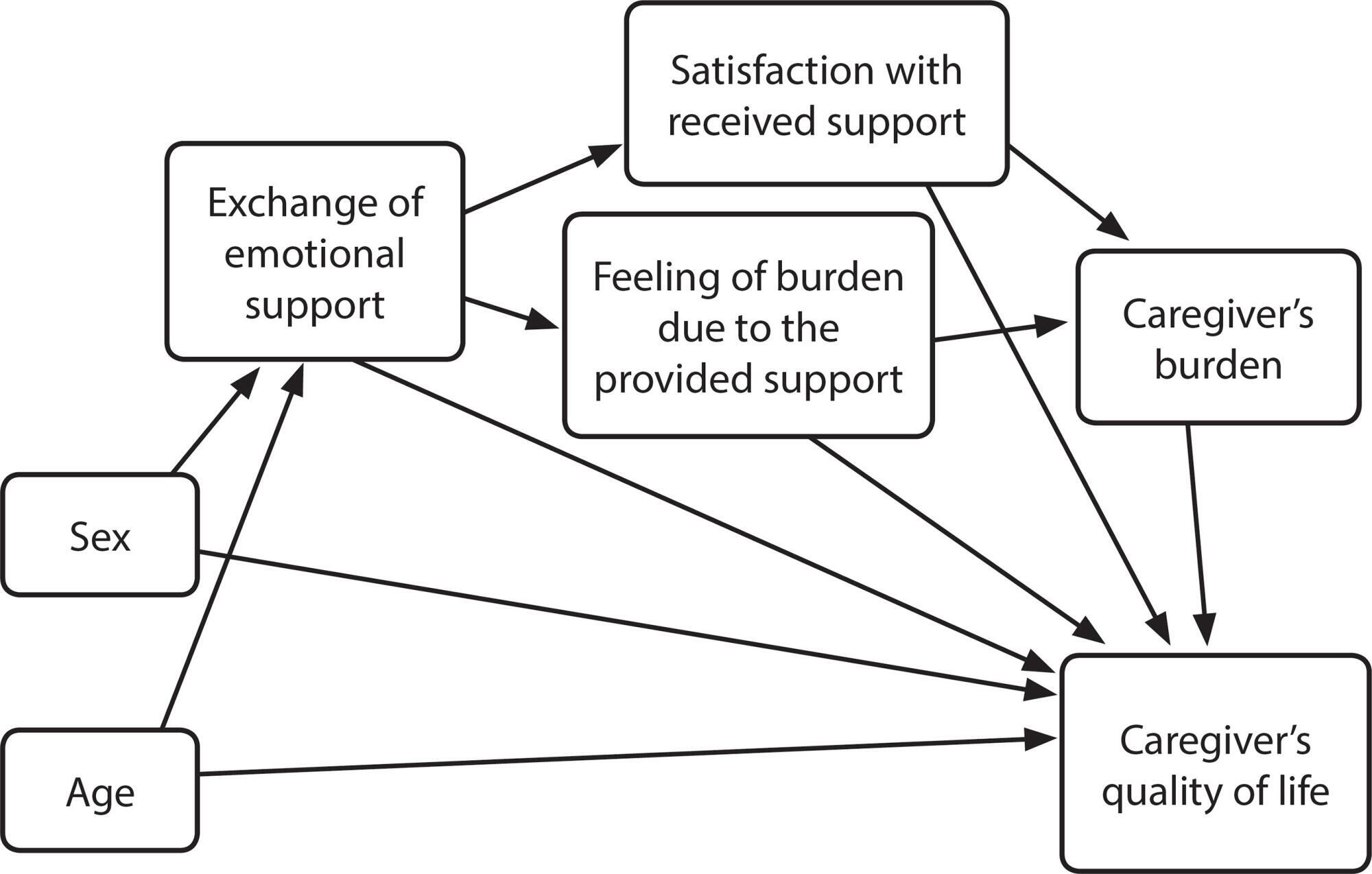-
RESEARCH
Social representations of sexuality for the elderly
Revista Brasileira de Enfermagem. 2015;68(4):662-667
01-01-2015
Abstract
RESEARCHSocial representations of sexuality for the elderly
Revista Brasileira de Enfermagem. 2015;68(4):662-667
01-01-2015DOI 10.1590/0034-7167.2015680413i
Views0See moreABSTRACT
Objective:
to know the social representations of sexuality for the elderly, based on the Social Representation Theory.
Method:
study performed in a Basic Family Health Unit in Maracanau-CE, Brazil, with 30 elderly adults. Data were collected from March through April of 2013, using the free word evocation technique. Data were organized and processed using the EVOC 2000.software
Results:
the subjects evoked 150 words associated with the evocator word “sexuality”. Out of these, 43 were different. At the possible core of the representation of sexuality for the elderly, the following words were found: love, affection and respect. Sex, companionship, understanding and coexistence composed the intermediate elements of representation.
Conclusion:
the performed analyses pointed to love, respect and affection as central elements that structured and organized the social representation of sexuality in the elder years for the group studied.
-
RESEARCH
Post-accident work behavior in caring for people with HIV/Aids
Revista Brasileira de Enfermagem. 2015;68(4):656-661
01-01-2015
Abstract
RESEARCHPost-accident work behavior in caring for people with HIV/Aids
Revista Brasileira de Enfermagem. 2015;68(4):656-661
01-01-2015DOI 10.1590/0034-7167.2015680412i
Views0ABSTRACT
Objective:
To identify post-accident conduct in the workplace by health professionals in caring for people with HIV/Aids.
Method:
A qualitative and descriptive research study with a socio-historical perspective (1986-2006), performed in a reference hospital for infectious diseases in the State of Santa Catarina. To collect data, interviews were conducted with oral history among 23 health workers and, for the treatment of data, Bardin’s content analysis was used.
Results:
Post-accident behaviors emerged that included assessment, accident records, chemoprophylaxis when necessary, support, monitoring of the injured worker, and mainly psychological support.
Conclusion:
In situations in which the accident could not be avoided, post-exposure behaviors were important biosecurity strategies mentioned by health workers caring for patients with HIV/Aids, in the sense of minimizing the possible transmission of the HIV virus.
Keywords:Acquired Immunodeficiency SyndromeHealth ProfessionalsOccupational AccidentsOccupational HealthOccupational RisksSee more -
RESEARCH
Nursing care management for children hospitalized with chronic conditions
Revista Brasileira de Enfermagem. 2015;68(4):641-648
01-01-2015
Abstract
RESEARCHNursing care management for children hospitalized with chronic conditions
Revista Brasileira de Enfermagem. 2015;68(4):641-648
01-01-2015DOI 10.1590/0034-7167.2015680410i
Views0See moreABSTRACT
Objective:
to understand the interactions of nurses managing nursing care for the hospitalized child with a chronic condition.
Method:
Theoretical and methodological references were used, Complex Thought and grounded theory, respectively. In the study 18 subjects have participated arranged in three groups: nurses, nursing technicians and family members. A semi-structured interview was used as technique for data collection. The data analysis followed three stages of coding: open, axial and selective.
Results:
the category “Needing to manage nursing care to the hospitalized child with chronic condition in Pediatric Inpatient Unit” and their subcategories show the complex inter subjective bindings established by nurses that support the practice of nursing care management.
Conclusion:
There are difficulties for nursing professionals to interact with the child’s family and the dialogical order/disorder/interaction/organization in the implementation of the management process of care is.
-
RESEARCH
Functional disability and socioeconomic and demographic factors in elderly
Revista Brasileira de Enfermagem. 2015;68(4):633-640
01-01-2015
Abstract
RESEARCHFunctional disability and socioeconomic and demographic factors in elderly
Revista Brasileira de Enfermagem. 2015;68(4):633-640
01-01-2015DOI 10.1590/0034-7167.2015680409i
Views0See moreABSTRACT
Objective:
to verify the prevalence of functional disability and associated socioeconomic and demographic factors in elderly patients of Campina Grande/PB.
Method:
cross-sectional study with elderly patients of both genders. The variables associated with functional disability were assessed using Poisson regression.
Results:
A total of 420 elderly patients were included (68.1% women). The highest prevalence of functional disability were found among females aged 80 or older, white, widowed, of economic classes D/E , who lived alone, with frequency of contacts of up to 224 people and diversity of contacts of up to 14 people. After multivariate analysis, statistically significant association was observed between functional disability, gender and age group.
Conclusion:
the association between functional disability gender and age group is shown to be an important guidance for health interventions since it will allow health services to plan actions aiming to improve, maintain or restore the functional capacity of the elderly population.
-
RESEARCH
Hypertension and Diabetes Mellitus Program evaluation on user’s view
Revista Brasileira de Enfermagem. 2015;68(4):626-632
01-01-2015
Abstract
RESEARCHHypertension and Diabetes Mellitus Program evaluation on user’s view
Revista Brasileira de Enfermagem. 2015;68(4):626-632
01-01-2015DOI 10.1590/0034-7167.2015680408i
Views0See moreABSTRACT
Objectives:
to evaluate the program proposed by the Reorganization Care Plan for Hypertension and Diabetes Mellitus on user’s view, and describe aspects of the trajectory of the participants correlating with the program’s evaluation.
Method:
evaluative study with a qualitative approach conducted in health units with the Family Health Strategy, in a city of the metropolitan region of Curitiba, in the period from September to March, 2012. A total of 30 adults with hypertension and/or Diabetes mellitus were interviewed. Data were analyzed through content analysis.
Results:
Four categories were identified: Disease diagnosis; Reasons for the program need; Knowledge of the program, and program evaluation.
Conclusion:
there was the recognition of the orientations, and the monitoring of activities developed, with emphasis in cost reduction for users.
-
RESEARCH
Violence in the eye of adolescents: education intervention with Culture Circles
Revista Brasileira de Enfermagem. 2015;68(4):617-625
01-01-2015
Abstract
RESEARCHViolence in the eye of adolescents: education intervention with Culture Circles
Revista Brasileira de Enfermagem. 2015;68(4):617-625
01-01-2015DOI 10.1590/0034-7167.2015680407i
Views0See moreABSTRACT
Objective:
to apply the methodology of Culture Circles on adolescents as a strategy for health education of nurses in the construction of the collective knowledge of the thematic violence.
Method:
action research type and qualitative study. Participants were 11 adolescents from a public school in Recife, PE, Brazil. Data production in Culture Circles included the participant observation with field diary, photographic recording and filming, as well as the photovoice technique. The analysis was performed by triangulating data in dialogue with the literature.
Results:
it was shown that the problematizing action provided by the Culture Circle made possible to create situations in which adolescents felt invited to critically refl ect on the phenomenon of violence in all its complexity.
Conclusion:
the health education intervention, performed by Culture Circles, added learning and mutual growth subsidizing nursing care actions that excel at leadership and autonomy of adolescents.

-
RESEARCH
Social representations about religion and spirituality
Revista Brasileira de Enfermagem. 2015;68(4):609-616
01-01-2015
Abstract
RESEARCHSocial representations about religion and spirituality
Revista Brasileira de Enfermagem. 2015;68(4):609-616
01-01-2015DOI 10.1590/0034-7167.2015680406i
Views0See moreABSTRACT
Objective:
to identify the social representations about the concepts of spirituality and religion of of health teachers.
Method:
exploratory and descriptive study, based on a qualitative approach. 25 subjects participated in it. The following instruments were used to collect data: questionnaire to identify the profile; questionnaire of free association, whose inducing words were religion and spirituality, and an interview based on the scale FICA (Puchalski, 2006).
Results:
the representations about religion and spirituality, for professors, are forged around the faith in God and it gives them meaning and purpose to deal with the challenges of personal and professional living.
Conclusion:
there are still barriers that need to be overcome with a view to a comprehensive care. For this, it is essential to incorporate spirituality in the process in the curricula of health courses.

-
Educational technology for bathing/hygiene of elders at home: contributions to career knowledge
Revista Brasileira de Enfermagem. 2021;74:e20200890
07-05-2021
Abstract
Educational technology for bathing/hygiene of elders at home: contributions to career knowledge
Revista Brasileira de Enfermagem. 2021;74:e20200890
07-05-2021DOI 10.1590/0034-7167-2020-0890
Views0See moreABSTRACT
Objective:
to build and validate an educational booklet for bathing and hygiene of elders at home.
Methods:
a methodological study, developed through data collection in literature and situational diagnosis, booklet construction, material qualification through validation by expert judges (11 nurses) and target audience (30 caregivers). Data were analyzed descriptively. The minimum content validity index of 0.80 was considered.
Results:
in content and appearance validation, experts assigned Content Validity Index global of 0.92, while for assessment of the material’s suitability, the booklet was classified as “superior”, with an average of 90%. In the validation of caregivers, the overall Content Validity Index was 1.0.
Conclusion:
the booklet was successfully validated and can be considered in the context of health education and collaborate with an adequate and safe practice of bathing and hygiene of elders at home.

-
ORIGINAL ARTICLE
From despair to hope: copying of relatives of hospitalized children before bad news report
Revista Brasileira de Enfermagem. 2020;73:e20200340
11-16-2020
Abstract
ORIGINAL ARTICLEFrom despair to hope: copying of relatives of hospitalized children before bad news report
Revista Brasileira de Enfermagem. 2020;73:e20200340
11-16-2020DOI 10.1590/0034-7167-2020-0340
Views0See moreABSTRACT
Objective:
to understand the experiences of relatives of critically ill children before bad news report.
Method:
a phenomenological study based on Heidegger’s philosophical framework. Data collection was carried out from October 2018 to March 2019, through phenomenological interviews with 15 relatives of children hospitalized in a Pediatric Intensive Care Unit.
Results:
relatives, in their existentiality, experience the facticity thrown into unpredictable situations, regardless of their choices and are faced with feelings of shock, despair and fear before bad news. After emotional impact, especially regarding the possibility of death, relatives reveal hope as a mechanism for coping with the situation.
Final considerations:
solidarity and sensitivity by health professionals, especially nurses, are essential in understanding the existential dimension of relatives who experience such an experience, understanding the several facets of their existence and offering them opportunities to project themselves.
-
ORIGINAL ARTICLE
Functional capacity assessment of long-lived older adults from Amazonas
Revista Brasileira de Enfermagem. 2019;72:49-55
12-05-2019
Abstract
ORIGINAL ARTICLEFunctional capacity assessment of long-lived older adults from Amazonas
Revista Brasileira de Enfermagem. 2019;72:49-55
12-05-2019DOI 10.1590/0034-7167-2017-0798
Views0See moreABSTRACT
Objective:
To evaluate the functional capacity of long-lived older adults from Amazonas.
Method:
A cross-sectional epidemiological study was carried out with 116 older adults aged 80 years or older, registered in a primary health care unit in Belém, in the state of Pará, Brazil. The Functional Independence Measure (FIM) was used for functional capacity assessment and the Mini-Mental State Examination (MMSE) for cognitive screening. Univariate and bivariate analyses were carried out, in addition to the Pearson’s chi-square test.
Results:
The older adults presented modified independence in the self-care, sphincter control and locomotion dimensions, and needed supervision for mobility/transfers. In mobility, men presented complete independence. Modified independence was found in the 80-89 age group. It was observed that, the lower the education level, the worse the cognitive performance.
Conclusion:
In spite of their advanced age, long-lived older adults still present functional capacity for activities of daily living, even though they required supervision for high energy expenditure tasks, such as mobility and transfers.
-
Educational technology on COVID-19 for families of children and adolescents with sickle cell disease
Revista Brasileira de Enfermagem. 2021;74:e20201045
06-11-2021
Abstract
Educational technology on COVID-19 for families of children and adolescents with sickle cell disease
Revista Brasileira de Enfermagem. 2021;74:e20201045
06-11-2021DOI 10.1590/0034-7167-2020-1045
Views0ABSTRACT
Objective:
to construct and validate educational technology on COVID-19 and essential care for families of children/adolescents with sickle cell disease.
Methods:
this is a methodological study, in three stages: 1) elaborated educational technology, using the Doak, Doak and Root theoretical-methodological model; 2) content and appearance validation by the content validity coefficient. Delphi technique was applied in two rounds (Delphi I [12 judges]/Delphi II [11 judges]); 3) conducting a pilot test with six families.
Results:
“Sickle cell disease and COVID-19: essential care” included: consequences of COVID-19 in sickle cell disease, guidelines for reducing the risks of contracting the virus and having complications, signs and symptoms of COVID-19, guidelines in case of child/adolescent with suspicion or symptoms of COVID-19. Global content validity coefficient (Delphi II): 0.98.
Conclusion:
educational technology presented content and appearance validity for families of children/adolescents with sickle cell disease, related to COVID-19.
Keywords:Anemia, Sickle CellCoronavirus InfectionsEducational TechnologyFamily NursingValidation StudiesSee more
-
ORIGINAL ARTICLE
Self-care activities, sociodemographic variables, treatment and depressive symptoms among older adults with Diabetes Mellitus
Revista Brasileira de Enfermagem. 2019;72:22-29
12-05-2019
Abstract
ORIGINAL ARTICLESelf-care activities, sociodemographic variables, treatment and depressive symptoms among older adults with Diabetes Mellitus
Revista Brasileira de Enfermagem. 2019;72:22-29
12-05-2019DOI 10.1590/0034-7167-2017-0579
Views0See moreABSTRACT
Objective:
to analyze the association between self-care activities of older adults with Type 2 Diabetes Mellitus (DM) and sociodemographic variables, type of treatment and depressive symptoms.
Method:
inferential and cross-sectional study, with 121 older adults with Type 2 DM in ambulatory care. We used a questionnaire for characterization of sociodemographic and health, questionnaire self-care activities with DM, Mini Mental State Examination and Geriatric Depression Scale. The association of variables was used (Fisher’s exact test) and for comparing the means (Student’s t-test and analysis of variance).
Results:
The mean age was 68.1 years, the majority were women (57.2%), retired (71.9%) and married (65.3%). The highest averages were for the activities: “to dry the spaces between the toes, after washing them” and smaller averages for “exercise”.
Conclusion:
In spite of high average for self-care activities, there is a need for enhanced performance and compliance to them.
-
ORIGINAL ARTICLE
Sickness absenteeism of Primary Health Care professionals before and during the COVID-19 pandemic
Revista Brasileira de Enfermagem. 2022;75:e20220028
08-26-2022
Abstract
ORIGINAL ARTICLESickness absenteeism of Primary Health Care professionals before and during the COVID-19 pandemic
Revista Brasileira de Enfermagem. 2022;75:e20220028
08-26-2022DOI 10.1590/0034-7167-2022-0028
Views0See moreABSTRACT
Objective:
to identify the frequency of occurrence of sickness absenteeism, according to the profile of Primary Health Care (PHC) professionals, and verify if there was an impact of the pandemic on absence duration and reason.
Methods:
a cross-sectional study, from January/2019 to December/2020, with PHC professionals from a municipality in northeastern São Paulo. Descriptive statistics were performed, with frequency calculation.
Results:
of the 977 PHC professionals, 633 (64.79%) used a medical certificate to justify their absence from work in 2019, and 837 (85.67%) in 2020. The main reason for leave was diseases of the musculoskeletal system and connective tissue in the two years. The mean duration of leave was 7.33 days (SD=17.33) in 2019 and 9.88 days (SD=16.05) in 2020. Nursing assistants were the ones who took the most leave in both years.
Conclusions:
there was an impact of the pandemic on absence duration and reason.
Search
Search in:
Nuvem de Tags
Aged (144) Atenção Primária à Saúde (239) COVID-19 (104) Cuidados de Enfermagem (269) Educação em Enfermagem (151) Educação em Saúde (139) Enfermagem (930) Estudos de Validação (131) Health Education (144) Idoso (208) Mental Health (149) Nursing (987) Nursing Care (306) Patient Safety (151) Primary Health Care (284) Qualidade de Vida (104) Quality of Life (106) Saúde Mental (145) Segurança do Paciente (150) Validation Studies (108)




